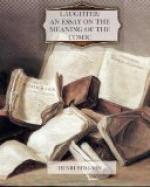Hence it follows that the elements of comic character on the stage and in actual life will be the same. What are these elements? We shall find no difficulty in deducing them. It has often been said that it is the trifling faults of our fellow-men that make us laugh.
Evidently there is a considerable amount of truth in this opinion; still, it cannot be regarded as altogether correct. First, as regards faults, it is no easy matter to draw the line between the trifling and the serious; maybe it is not because a fault is trifling that it makes us laugh, but rather because it makes us laugh that we regard it as trifling, for there is nothing disarms us like laughter. But we may go even farther, and maintain that there are faults at which we laugh, even though fully aware that they are serious,—Harpagon’s avarice, for instance. And then, we may as well confess—though somewhat reluctantly—that we laugh not only at the faults of our fellow-men, but also, at times, at their good qualities. We laugh at Alceste. The objection may be urged that it is not the earnestness of Alceste that is ludicrous, but rather the special aspect which earnestness assumes in his case, and, in short, a certain eccentricity that mars it in our eyes. Agreed; but it is none the less true that this eccentricity in Alceste, at which we laugh, makes his earnestness laughable, and that is the main point. So we may conclude that the ludicrous is not always an indication of a fault, in the moral meaning of the word, and if critics insist on seeing a fault, even though a trifling one, in the ludicrous, they must point out what it is here that exactly distinguishes the trifling from the serious.
The truth is, the comic character may, strictly speaking, be quite in accord with stern morality. All it has to do is to bring itself into accord with society. The character of Alceste is that of a thoroughly honest man. But then he is unsociable, and, on that very account, ludicrous. A flexible vice may not be so easy to ridicule as a rigid virtue. It is rigidity that society eyes with suspicion. Consequently, it is the rigidity of Alceste that makes us laugh, though here rigidity stands for honesty. The man who withdraws into himself is liable to ridicule, because the comic is largely made up of this very withdrawal. This accounts for the comic being so frequently dependent on the manners or ideas, or, to put it bluntly, on the prejudices, of a society.




